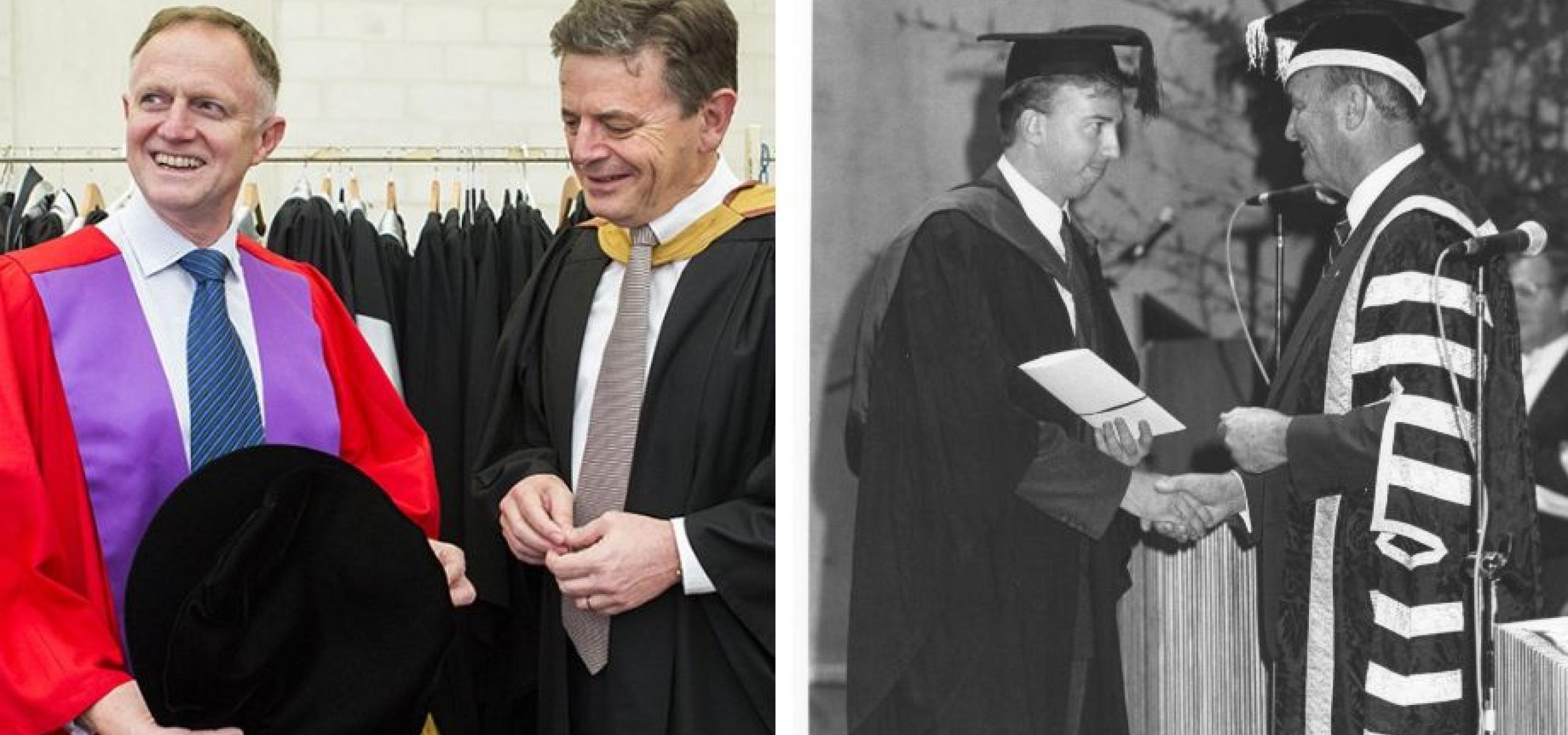
The Hon Justice Stephen Gageler AC (left) with Professor Stephen Bottomley FAAL in 2015 when he received his Honorary Doctorate and (right) the Hon Justice Robert Beech-Jones receives his testamur at his graduation from ANU Pro-Chancellor Sir Geoffrey Yeend in 1988. Photos: Stuart Hay/ANU
As Australia’s national law school, it brings us great pleasure to have not one but two of our alumni appointed as justices of the High Court of Australia.
The Australian National University (ANU) College of Law congratulates two of its alumni, the Honourable Justice Stephen Gageler AC (BEc '80, LLB (Hons) '82, HonLLD '15) and the Honourable Justice Robert Beech-Jones (BSc, LLB (Hons) ’88), on their appointments to the High Court of Australia.
Justice Gageler will succeed Chief Justice Susan Kiefel AC upon her retirement in November 2023, while Justice Beech-Jones will fill the vacancy created by Justice Gageler’s elevation.
ANU College of Law Head of School Professor James Stellios FAAL said the appointments of two alumni to the highest court in the land represented a proud milestone in the College's 63-year history.
“As Australia’s national law school, it brings us great pleasure to have not one but two of our alumni appointed as justices of the High Court of Australia. The Hon Justices Stephen Gageler AC and Robert Beech-Jones have maintained close ties to the ANU College of Law, and the occasion of their new appointments is a proud day for our law school," he said.
"It is also a wonderful tribute to our past faculty – including Professors Leslie Zines AO, David Hambly FAAL and Dennis Pearce AO FAAL – who no doubt had a profound influence on their legal education.”
In a media release, the Prime Minister and Attorney-General said Justice Gageler had an "outstanding reputation" as a jurist and had served on the High Court with distinction since his appointment to the bench in 2012.
A former Commonwealth Solicitor-General, Justice Gageler is the most senior justice on the High Court bench after Chief Justice Kiefel. He has maintained strong ties to the ANU College of Law throughout his illustrious legal career, receiving an honorary doctorate in 2015 in recognition of his contribution to public service and the practice of law.
In 2011, he delivered a graduation speech to ANU College of Law graduands in which he extolled the importance of integrity.
“Integrity is an intensely human quality fundamental to the operation of a legal system. Without integrity in the administration of the law, the rule of law self-destructs from within,” he said.
Justice Gageler also met his wife Carla, a teacher, while both were studying at ANU. At the age of 23, he served as an associate for Sir Anthony Mason AC KBE GBM KC, the ninth Chief Justice on the High Court (1987-95) and a former visiting fellow at the ANU College of Law.
Justice Beech-Jones has been a judge of the New South Wales Supreme Court since 2012, becoming the chief judge of the common law division of that court in 2021. From 2016 to 2018, he was President of the Judicial Conference of Australia.
Justice Beech-Jones was admitted as a barrister in 1992 and was appointed Senior Counsel in 2006. His exceptional legal career has involved carriage of a wide range of matters, particularly in criminal law, immigration law, social security and administrative law, and commercial law.
In an email interview with the ANU College of Law, Justice Beech-Jones acknowledged the significant influence of his law studies at ANU on his career and outlook on the law.
“To me, it seemed like a golden age of teaching because the quality of teaching it was so high including (Professors) John McMillan, Dennis Pearce, Paul Finn, Geoffrey Lindell, Phillipa Weeks and the incomparable Leslie Zines,” he said.
Asked if there were any particularly fond memories or influential experiences from his time at ANU, Justice Beech-Jones said: "I have many, but Professor Zines' review of the Communist Party Case and its history is very much a standout.”